In communities worldwide, churches stand as not just places of worship but as pillars of support, community engagement, and cultural heritage.
However, maintaining these sacred spaces often requires substantial financial resources, especially when repairs or improvements are necessary.
This is where grants for church improvements and church repairs play a crucial role, providing vital funding to ensure the preservation and enhancement of these cherished institutions.
For centuries, churches have served as gathering places, offering solace, guidance, and a sense of belonging to their congregations.
Yet, the upkeep of these historic buildings can present significant challenges, from aging infrastructure to the need for modern amenities to better serve the community.
Without proper maintenance and repairs, these architectural treasures risk falling into disrepair, jeopardizing not only their structural integrity but also their ability to fulfill their mission.
Fortunately, numerous organizations and foundations recognize the importance of preserving and enhancing churches for future generations.
Through grants for church improvements and repairs, these entities provide financial assistance to address a wide range of needs, from structural renovations to technological upgrades.
By securing such grants, churches can undertake essential projects to ensure their continued vitality and relevance in the communities they serve.
In this article, we will explore the various aspects of obtaining grants for church improvements and repairs, including eligibility criteria, application processes, types of grants available, and a list of reputable granting organizations.
By understanding these key components, churches can navigate the grant-seeking process with confidence, ensuring the preservation and enhancement of their sacred spaces for years to come.
How to Get Grants for Church Improvements and Church Repairs
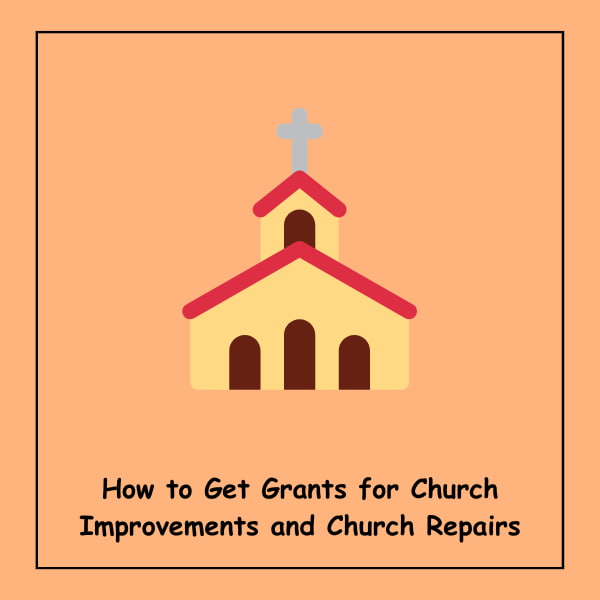
Seeking grants for church improvements and repairs requires careful planning, attention to detail, and a clear understanding of the application process.
Here’s a step-by-step guide to help churches navigate the process and increase their chances of securing much-needed funding:
- Research Grant Opportunities: Begin by researching potential grant opportunities specifically tailored to church improvements and repairs. Look for granting organizations, foundations, and government agencies that offer funding for such projects. Websites, grant databases, and networking within the religious and nonprofit communities can be valuable resources for identifying potential sources of funding.
- Review Eligibility Criteria: Before applying for any grants, carefully review the eligibility criteria outlined by each granting organization. Common eligibility requirements may include nonprofit status, demonstrated financial need, adherence to specific project guidelines, and alignment with the grantor’s mission and priorities. Ensure that your church meets all eligibility criteria before proceeding with the application process.
- Prepare Required Documents: Gather all necessary documents and information required for the grant application process. This may include financial statements, project proposals, letters of support from community members or stakeholders, documentation of nonprofit status, and any other materials requested by the granting organization. Organize these documents in a clear and concise manner to present a compelling case for funding.
- Develop a Detailed Project Proposal: Craft a detailed project proposal outlining the specific improvements or repairs your church intends to undertake with the grant funds. Clearly articulate the project’s objectives, scope, timeline, budget, and anticipated impact on the church community and surrounding area. Tailor your proposal to align with the priorities and preferences of the granting organization, emphasizing how your project meets their criteria and addresses pressing needs.
- Complete the Application Form: Follow the instructions provided by the granting organization to complete the grant application form accurately and thoroughly. Pay close attention to formatting requirements, word limits, and any specific questions or prompts included in the application. Provide clear and concise responses supported by relevant data and evidence wherever possible.
- Submit the Application: Submit your completed grant application before the specified deadline, ensuring that all required documents and materials are included. Double-check the application for any errors or omissions before submission, and retain copies of all submitted materials for your records. If submitting the application electronically, confirm receipt with the granting organization to ensure it was successfully received.
- Follow-Up as Needed: After submitting the grant application, be prepared to follow up with the granting organization as needed. This may include providing additional information or clarification in response to questions from the grantor, attending interviews or site visits, or participating in follow-up discussions about the project. Maintain open communication with the granting organization throughout the review process to demonstrate your church’s commitment and readiness to receive funding.
By following these steps and diligently pursuing grant opportunities, churches can increase their chances of obtaining funding for much-needed improvements and repairs, ensuring the continued vitality and relevance of their sacred spaces for generations to come.
Eligibility Criteria for Grants for Church Improvements and Church Repairs
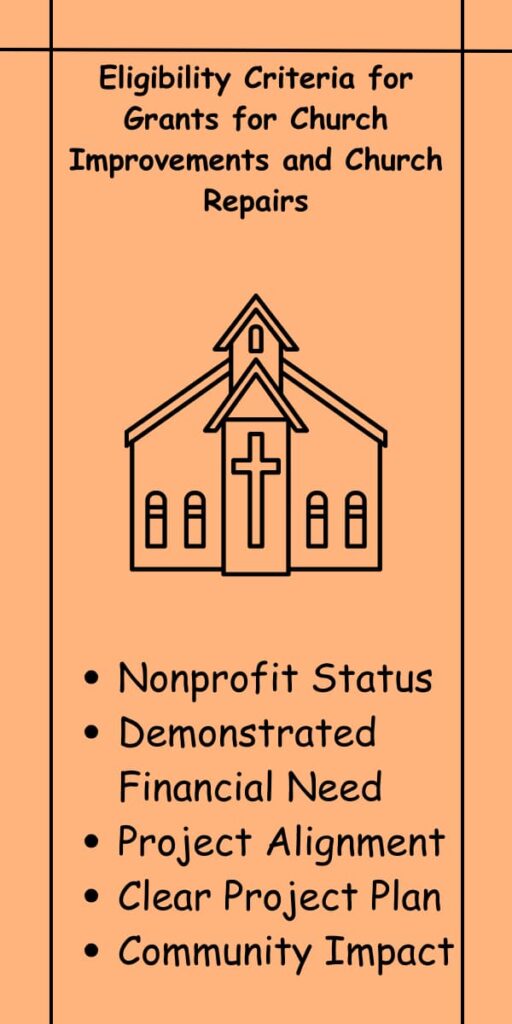
- Nonprofit Status: Granting organizations typically require churches to hold official nonprofit status recognized by relevant governmental authorities. This status ensures that churches operate for charitable, religious, educational, or other exempt purposes, making them eligible to receive grants and donations.
- Demonstrated Financial Need: Grantors often prioritize churches that can demonstrate a genuine financial need for assistance with improvements or repairs. Alongside standard financial statements, churches may need to provide detailed explanations of their financial situation, including factors such as declining membership, limited revenue sources, or unexpected expenses.
- Project Alignment: It’s crucial for churches to ensure that their proposed project aligns with the mission and priorities of the granting organization. This alignment may involve demonstrating how the project addresses specific community needs, supports the organization’s goals, or aligns with its focus areas, such as historic preservation, community development, or religious outreach.
- Clear Project Plan: Granting organizations expect churches to present a clear and comprehensive plan for the proposed improvements or repairs. This plan should include a detailed description of the project scope, objectives, and anticipated outcomes, as well as a breakdown of costs, a timeline for completion, and strategies for project management and oversight.
- Community Impact: Grantors often assess the potential impact of the proposed project on the church community and the broader community. Churches should articulate how the improvements or repairs will benefit congregants, enhance the church’s ability to serve its community, and contribute to the overall well-being, vitality, and resilience of the neighborhood or region.
Document Requirements for Grants for Church Improvements and Church Repairs
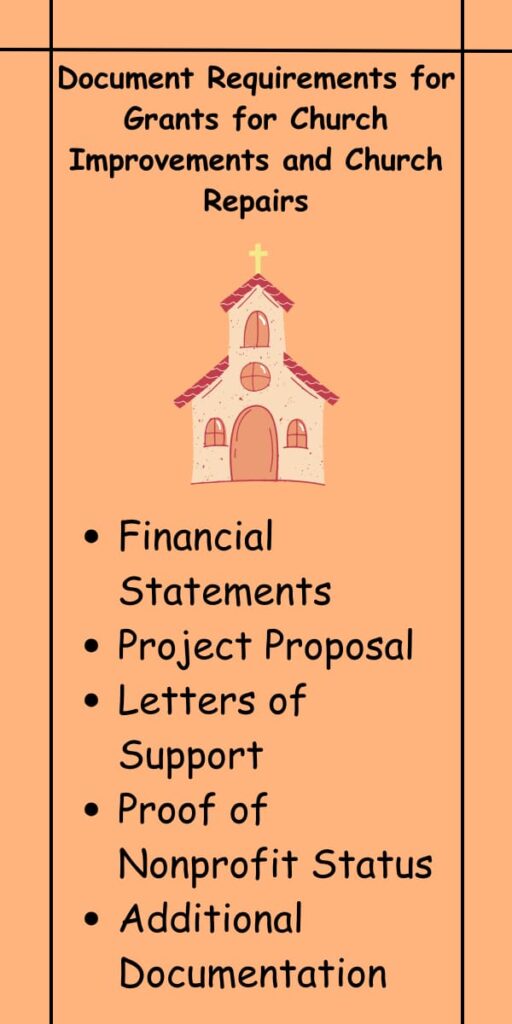
- Financial Statements: Granting organizations typically require churches to provide recent financial statements, including income statements, balance sheets, and cash flow statements. These documents offer insights into the church’s financial health, stability, and capacity to manage grant funds effectively.
- Project Proposal: A well-crafted project proposal serves as a cornerstone of the grant application. The proposal should provide a comprehensive overview of the proposed project, including its objectives, methodology, anticipated outcomes, and evaluation plan. It should also address how the project aligns with the grantor’s priorities and community needs.
- Letters of Support: Churches may be asked to include letters of support from community members, stakeholders, or partner organizations endorsing the proposed project. These letters demonstrate community engagement, collaboration, and support, reinforcing the project’s credibility and potential impact.
- Proof of Nonprofit Status: Granting organizations typically require churches to submit documentation proving their nonprofit status, such as a copy of their tax-exempt determination letter from the Internal Revenue Service (IRS) or relevant government agency. This documentation verifies the church’s eligibility to receive charitable contributions and grants.
- Additional Documentation: Depending on the specific requirements of the granting organization and the nature of the proposed project, churches may need to provide additional documentation. This could include architectural plans, contractor estimates, permits or licenses, environmental assessments, historical preservation reports, or other relevant materials.
Application Process for Grants for Church Improvements and Church Repairs
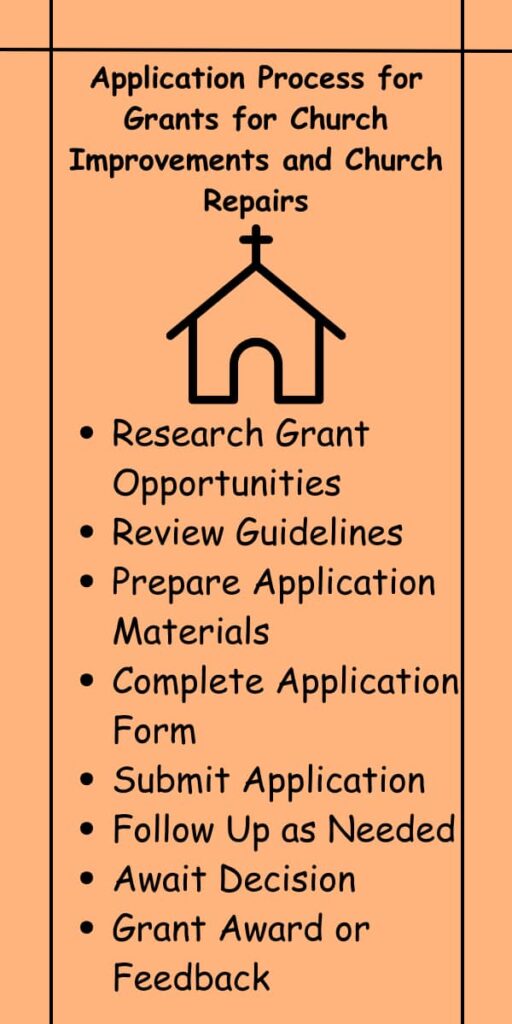
- Research Grant Opportunities: Begin by conducting thorough research to identify potential grant opportunities that align with your church’s needs and priorities. Explore grant databases, funding directories, and online resources, and reach out to local foundations, religious organizations, and government agencies for information and guidance.
- Review Guidelines: Carefully review the guidelines and eligibility criteria provided by each granting organization to determine if your church qualifies for funding. Pay close attention to application deadlines, formatting requirements, and specific instructions for submitting materials, as failure to adhere to these guidelines could result in disqualification.
- Prepare Application Materials: Gather all required documents and information needed to complete the grant application. This may include financial statements, project proposals, letters of support, proof of nonprofit status, and any additional documentation requested by the granting organization. Organize your materials in a clear, logical manner to facilitate the application process.
- Complete Application Form: Fill out the grant application form accurately and completely, providing detailed responses to all questions or prompts. Tailor your responses to highlight the significance of your project, its alignment with the grantor’s priorities, and its potential impact on the community. Be concise yet thorough, ensuring that your application effectively communicates the merits of your proposal.
- Submit Application: Submit your completed grant application before the specified deadline, following the submission instructions provided by the granting organization. Double-check that all required documents and materials are included, and retain copies of your submission for your records. If submitting electronically, confirm receipt of your application to ensure it was successfully received.
- Follow Up as Needed: After submitting your application, be prepared to follow up with the granting organization as needed. This may involve providing additional information or clarification, participating in interviews or site visits, or responding to inquiries from the grantor during the review process. Maintain open communication with the grantor and be responsive to any requests for further information or assistance.
- Await Decision: Once your application has been submitted, await a decision from the granting organization regarding the status of your grant request. This process may take several weeks or months, depending on the grantor’s review schedule and timeline. Be patient and proactive in following up on the status of your application if necessary, and be prepared to provide any additional information requested by the grantor.
- Grant Award or Feedback: If your church’s grant application is successful, celebrate the award and begin planning for the implementation of the proposed project. If your application is not selected for funding, seek feedback from the granting organization to understand areas for improvement and consider reapplying in the future or exploring alternative funding sources. Use any feedback received to strengthen future grant applications and increase your church’s chances of securing funding for important improvements and repairs.
Types of Grants Offered for Church Improvements
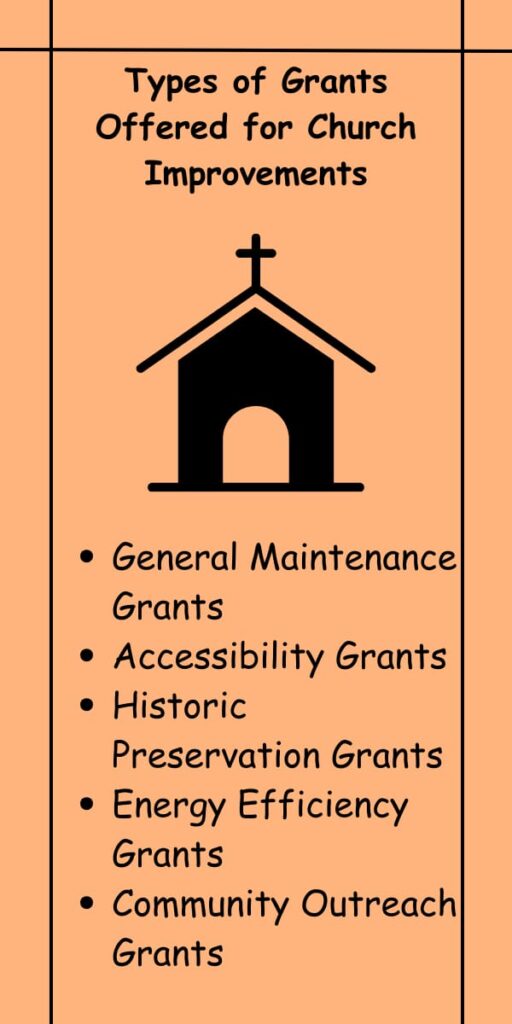
- General Maintenance Grants: These grants provide essential funding for routine upkeep and maintenance tasks necessary to keep church facilities in optimal condition. They encompass a wide range of repairs and renovations, including fixing leaking roofs, repairing damaged walls or flooring, upgrading aging HVAC systems, and addressing plumbing or electrical issues. General maintenance grants are instrumental in ensuring that churches can continue to provide safe and welcoming spaces for worship and community activities.
- Accessibility Grants: Accessibility grants focus on removing barriers and ensuring equitable access for individuals with disabilities within church premises. These grants may cover the cost of installing wheelchair ramps, constructing accessible entrances and restrooms, retrofitting seating areas to accommodate mobility aids, and providing assistive listening devices or sign language interpretation services. By improving accessibility, churches can foster inclusivity and create an environment where all members of the community feel valued and welcome.
- Historic Preservation Grants: Churches with historical significance often require specialized funding to preserve their architectural heritage and cultural legacy. Historic preservation grants support efforts to restore and maintain historic church buildings, including repairing or replacing ornate stained glass windows, preserving intricate woodwork or stonemasonry, and conducting structural assessments to ensure the integrity of historic structures. These grants play a vital role in safeguarding the rich history and heritage embodied by historic churches for future generations to appreciate and enjoy.
- Energy Efficiency Grants: In an era of increasing environmental awareness and rising energy costs, energy efficiency grants help churches reduce their carbon footprint and operational expenses while promoting sustainability. These grants may fund initiatives such as upgrading lighting fixtures to energy-efficient LED bulbs, installing programmable thermostats and energy management systems, improving insulation and weatherization, and investing in renewable energy technologies like solar panels or geothermal heating and cooling systems. By implementing energy-saving measures, churches can demonstrate responsible stewardship of resources and contribute to environmental conservation efforts.
- Community Outreach Grants: Community outreach grants support churches in their efforts to address social issues and meet the needs of underserved populations in their local communities. These grants may fund initiatives such as establishing food pantries or soup kitchens to combat hunger, providing shelter and support services for homeless individuals and families, offering educational programs for at-risk youth, or organizing outreach events and wellness programs for community members. By actively engaging with and serving their communities, churches can fulfill their mission of compassion, service, and social justice, making a positive impact on the lives of those in need.
List of Organizations that Offer Grants for Church Improvements
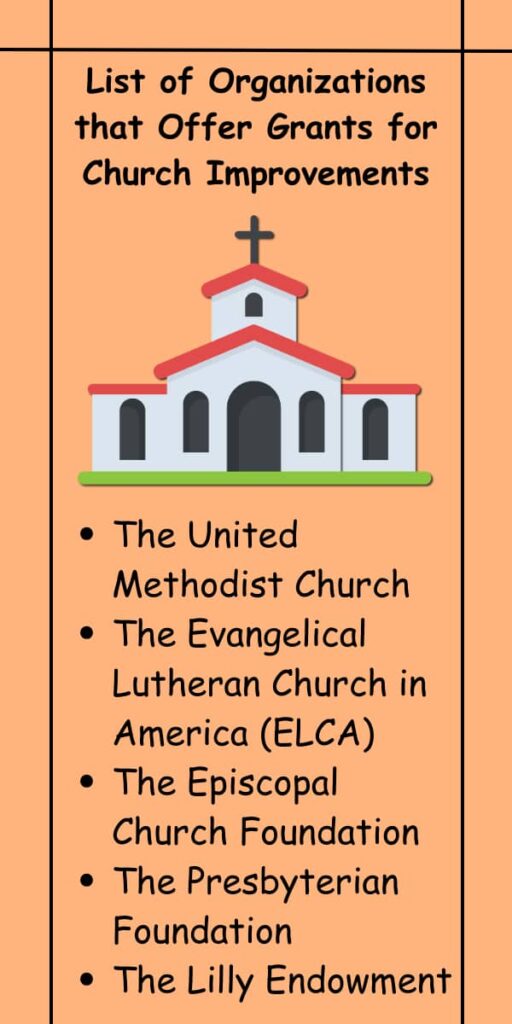
- The United Methodist Church: As one of the largest Protestant denominations globally, The United Methodist Church provides various grant opportunities to support church improvements and community outreach initiatives. These grants may include funding for infrastructure upgrades, renovations, and programs aimed at enhancing the overall ministry and mission of Methodist congregations. The denomination’s commitment to social justice and community service often influences the types of projects supported through its grant programs.
- The Evangelical Lutheran Church in America (ELCA): The ELCA Foundation offers grants to congregations and ministries affiliated with the Evangelical Lutheran Church in America to support capital projects, including church improvements and repairs. These grants may cover expenses related to building renovations, accessibility upgrades, technology enhancements, and energy efficiency initiatives. Additionally, the ELCA Foundation may prioritize projects that align with the denomination’s mission priorities, such as social advocacy, global mission work, and interfaith dialogue.
- The Episcopal Church Foundation: The Episcopal Church Foundation administers grant programs designed to assist Episcopal congregations with various aspects of church improvement and development. Grants may be available for building renovations, historic preservation efforts, ministry expansion initiatives, and innovative outreach projects. The Episcopal Church Foundation prioritizes projects that promote congregational vitality, strengthen community engagement, and advance the Episcopal Church’s mission and values.
- The Presbyterian Foundation: The Presbyterian Foundation offers grant opportunities to Presbyterian Church (U.S.A.) congregations and ministries seeking funding for capital projects and church improvements. Grants may support renovations, facility upgrades, technology investments, and other initiatives aimed at enhancing worship experiences and fostering community connections. The Presbyterian Foundation prioritizes projects that align with the denomination’s commitment to spiritual growth, social justice, and inclusive ministry.
- The Lilly Endowment: While not specific to any particular denomination, the Lilly Endowment occasionally offers grants to religious organizations, including churches, for a variety of purposes, including church improvements and renovations. The Lilly Endowment’s grant programs often focus on supporting innovative approaches to ministry, leadership development, and community engagement. Churches seeking funding from the Lilly Endowment may need to demonstrate how their proposed projects align with the organization’s broader goals and priorities.
Conclusion:
In conclusion, the availability of grants for church improvements from organizations such as The United Methodist Church, The Evangelical Lutheran Church in America, The Episcopal Church Foundation, The Presbyterian Foundation, and The Lilly Endowment underscores the commitment of religious denominations and philanthropic entities to support the ongoing vitality and mission of congregations.
By accessing these grant opportunities, churches can address critical infrastructure needs, enhance accessibility, preserve historical heritage, and expand their capacity for ministry and community service.
As churches navigate the grant application process, it’s essential to carefully review eligibility criteria, prepare thorough proposals, and maintain a focus on alignment with the mission and values of both the granting organization and the church itself.
With strategic planning and perseverance, churches can secure the resources needed to embark on transformative projects that strengthen their impact and relevance in the communities they serve.
[the_ad id=”39205″]
Frequently Asked Questions (FAQ):
What Types of Projects Are Typically Funded by Grants for Church Improvements and Repairs?
Grants often cover a range of projects, including general maintenance, accessibility upgrades, historic preservation, energy efficiency initiatives, and community outreach programs.
How Can I Find Grant Opportunities for My Church?
Research potential grant opportunities through online databases, religious organizations, and government agencies. Networking within the religious and nonprofit communities can also provide valuable leads.
What Eligibility Criteria Do Churches Need to Meet to Apply for Grants?
Common eligibility criteria include nonprofit status, demonstrated financial need, alignment with the granting organization’s mission, and adherence to specific project guidelines.
How Can I Demonstrate Financial Need in the Grant Application?
Alongside financial statements, provide detailed explanations of the church’s financial situation, such as declining membership, limited revenue sources, or unexpected expenses.
What Documents Are Required for a Grant Application?
Required documents may include financial statements, a detailed project proposal, letters of support, proof of nonprofit status, and any additional documentation requested by the granting organization.
How Important Is Community Impact in the Grant Application Process?
Community impact is often a crucial consideration for grantors. Clearly articulate how the proposed project will benefit the church community and contribute to the overall well-being and vitality of the broader community.
Can Churches Apply for Grants from Multiple Organizations Simultaneously?
Yes, churches can apply for grants from multiple organizations simultaneously. However, it’s essential to carefully review each granting organization’s guidelines and ensure that the projects align with their specific criteria.
How Long Does the Grant Application Process Typically Take?
The duration varies, but the process may take several weeks or months. It depends on the granting organization’s review schedule and timeline. Patience is key, and churches should be proactive in following up on the status of their application if necessary.
What Should I Do If My Grant Application Is Not Selected for Funding?
Seek feedback from the granting organization to understand areas for improvement. Use the feedback to strengthen future grant applications or explore alternative funding sources.
Can Churches Reapply for Grants If Their Initial Application Is Unsuccessful?
Yes, churches can reapply for grants in the future. Use feedback from previous applications to improve proposals and increase the chances of securing funding.
Leave a Reply